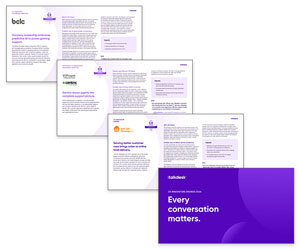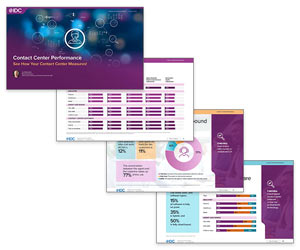Talkdesk’s Celia Cerdeira explains fourteen tips for amazing call centre customer service.
Customer service expectations have risen significantly over the last few years. According to a recent study from Salesforce, 88% of customers surveyed say that the customer service experience is just as important as products or services when making a buying decision—up from 80% in 2020.
And almost everyone surveyed (94%) stated that a positive customer service experience makes them more likely to purchase a product again.
Providing an exceptional customer experience is no longer optional in today’s world, it’s a necessity.
To enhance your contact centre’s performance, it is essential to train and develop knowledgeable, empathetic, and efficient customer service agents.
The following customer service tips for call centres can help reinforce existing training or serve as a foundation for a strong enablement program that helps your agents confidently address customer concerns, provide accurate information, and deliver a personalized customer experience.
14 Customer Service Tips for Contact Centres.
The following customer service tips are deeply rooted in the principles of effective communication, empathy, and problem-solving and can dramatically improve your customer interactions.
1. Engage in Active Listening.
Active listening allows for a better understanding of the customer’s needs and shows the agent’s willingness to help. To listen actively, allow the customer to talk without interruption, reflect their main question or concern back to them, and ask clarifying questions as necessary.
2. Highlight Understanding.
Ensure that each customer is aware that you understand their needs. By repeating each customer’s concerns back to them and asking relevant questions, customer service agents can communicate that they understand the customers and are making an effort to help solve their problems.
3. Be Courteous.
Be polite and have respect for your customers. Always use “please” and “thank you” to create an inviting contact centre environment and build positive customer relationships. Let your customer finish speaking before you begin speaking, and always maintain a professional and calm tone of voice.
4. Call the Customer by Their Name.
Ask the customer their name and pronounce it correctly. This communicates respect for the customer and lets them know that they are important.
5. Go the Extra Mile.
Demonstrate through actions that the customer is important by giving more than the minimum effort required. This could be something as simple as reviewing their previous call notes so you can speak with authority on their inquiry.
If you have access to all of their products and services, conduct a quick review to ensure your customer has everything they need in addition to a resolution to their inquiry.
Is there a way you can save them money by bundling their services? Take the initiative to provide better service or give the customer something extra to make them feel valued and appreciated.
6. Ask Open Questions.
Rather than simply repeating your customer’s statements, ask questions that encourage the customer to give more information in their own words.
For example, if the customer mentions a fee, don’t just repeat what they say “So you’re calling about a fee.”
Instead, ask an open-ended question: “I see you are calling about a fee on your account. Would you mind telling me a little bit more so I can help you?” Asking appropriate questions makes the conversation more collaborative and gets to the root cause of the issue.
7. Empower Customers With the Right Information.
Giving customers all the information they need empowers them to make informed decisions. When there are options, thoroughly describe each available alternative. This will help them be more involved in solving their problems and result in higher customer satisfaction.
You’ll also want to ensure that you’re providing accurate responses to customer inquiries, so you can resolve their queries faster.
By using an AI-powered knowledge management tool, agents can get complete answers to customer queries with just a quick search.
8. Explain Your Processes.
Customers are not always familiar with your company’s policies or procedures. Thoroughly explain to customers what you’re doing and why you’re doing it. Clear understanding tends to decrease customer frustration.
9. Use Simple Language.
Avoid technical terms, jargon, and acronyms. Be professional, concise, and clear.
10. Elevate to a Supervisor When Necessary.
When the customer’s needs are beyond your expertise or level of competency, refer them to a colleague, a supervisor, or a manager. Always explain to the customer that they will be transferred to someone who can effectively address their problem.
11. Be Empathetic but Keep It Professional.
Be aware of the way your customer is speaking. While it can be hard to listen to an upset or angry customer, it is important to remain professional. Approach the conversation from a place of empathy without over-promising.
Make your customer feel heard, and keep focused on the solutions rather than the problem. This way your customer feels understood, and knows you are working to find a resolution that will benefit you both.
12. Be Proactive.
Your primary goal is to resolve their immediate issue, but don’t stop there! Find ways to proactively improve all aspects of your customer’s experience while you have them in front of you.
One great way to do this is to make sure your customer’s personal details are up to date. Confirm that you still have their correct phone number, address, and email.
Also, if it has been some time since your customer’s last interaction, why not see if their services and products are still the best fit for their current situation? A proactive check-in with your customer could be the difference between a neutral NPS score and a 9 or a 10.
13. Personalize Your Recommendations.
Providing personalized recommendations can help a customer resolve their query faster and increase customer satisfaction.
Explain why you are making the suggestion based on what you have discovered in your conversation, and from a scan of your customer’s contact record.
Artificial intelligence (AI) tools like virtual agents and knowledge bases can also help you to be proactive and efficient by prompting automated suggestions on query solutions.
14. Take Detailed Call Notes and Create an After-Call Summary.
Taking detailed call notes and providing an after-call summary is essential for excellent call centre customer service. It can be difficult since agents typically need to quickly move on to their next call and increase their speed-of-answer rate.
But, it’s important to take the extra step to accurately summarize the interaction in the customer’s call notes so that agents can save the customer from any frustration if they call again about the same issue.
You don’t need to do this process manually anymore. AI-powered tools, such as automatic summary, use the same LLM powering ChatGPT to create after-call summaries instantly, reducing the amount of after-call work for agents.
Key Takeaways for Providing Exceptional Contact Centre Customer Service.
To improve call centre customer service, it is crucial to take the following actions:
- Empower your team. Invest in the professional development of your call centre team to equip them with effective communication, empathy, and problem-solving skills.
- Implement practical techniques. Utilize strategies like active listening, demonstrating understanding, and maintaining courteous communication.
- Be proactive and clear. Engage proactively to meet customer needs, leverage advanced tools like AI for efficiency, and provide clear and honest information about products or services to enhance the customer experience.
Follow these key takeaways to improve your call centre’s customer service and deliver exceptional experiences to your customers.
This blog post has been re-published by kind permission of Talkdesk – View the Original Article
For more information about Talkdesk - visit the Talkdesk Website
Call Centre Helper is not responsible for the content of these guest blog posts. The opinions expressed in this article are those of the author, and do not necessarily reflect those of Call Centre Helper.
Author: Talkdesk
Published On: 24th Jul 2023 - Last modified: 9th Dec 2024
Read more about - Guest Blogs, Celia Cerdeira, Talkdesk






 Talkdesk is a global customer experience leader for customer-obsessed companies. Our contact center solution provides a better way for businesses and customers to engage with one another.
Talkdesk is a global customer experience leader for customer-obsessed companies. Our contact center solution provides a better way for businesses and customers to engage with one another. 































